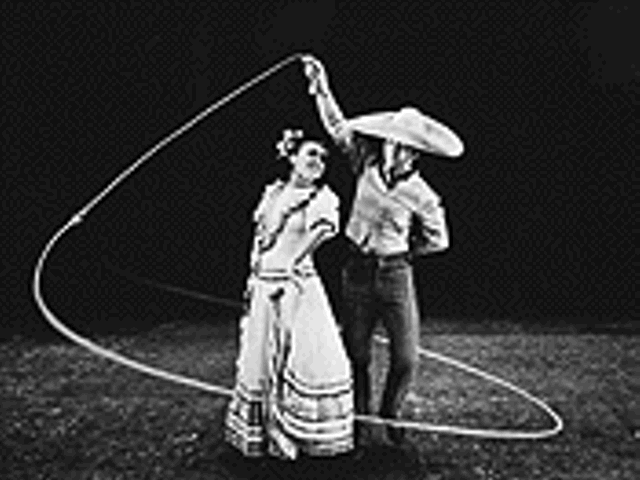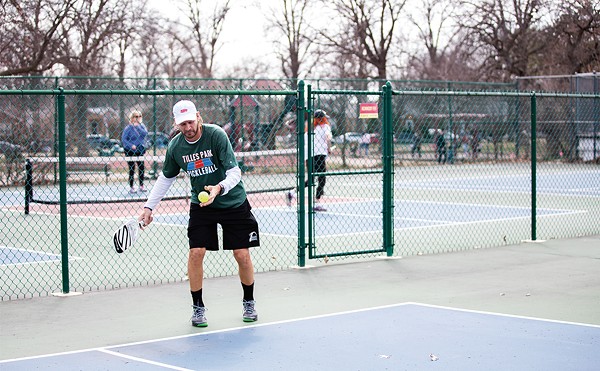When it's proposed that Synchronia's music is "accessible," Clark counters that the music they play simply "speaks more readily" to an audience than one might expect, then provides a list of instances to demonstrate just how accessible the group's music is. However you choose to phrase it, it's obvious that audience rapport is key to Synchronia's project. For instance, there's the choice of venue for the group's upcoming season. Washington University's Steinberg Auditorium, where Synchronia opens its 15th season on Oct. 9, has no stage and therefore one fewer barrier between performers and audience, part of providing what Clark calls an "ongoing reception," an engagement with the audience that begins the moment the listener hits the door. Still, although the aim may be admirable, the practice has raised some critical hackles. Apparently one critic took issue with Synchronia's performance of Terry Riley's "In C," not on the program proper but at a reception afterward — while audience members chatted over refreshments.
Misgivings about such tactics are understandable, but even so, it was a gesture made in the spirit of enthusiastic outreach common to Synchronia undertakings. Consider the "Compose Your Own" program. During the course of a five-day workshop for students in grades 3-6, the participants are encouraged to compose musical pieces using notational symbols of their own devising. By the end of the workshop, the children's scores bear sufficient resemblance to conventional tablature to allow Synchronia to perform some of these pieces, allowing the tyro composers a chance to hear their work realized. The project expresses the same impulse as their "Audience Selects" program. This season marks the fourth time that the bulk of the final evening's program is chosen by an audience vote taken during the season. Not only are those who attend the concerts encouraged to vote on their favorite pieces, they are asked to choose those that they liked least. It's a means of soliciting feedback and of giving the audience an opportunity to collaborate on the shape of seasons to come.
The process of gathering material for the season's programs is a daunting task in itself. Along with the unsolicited scores that publishers forward to Synchronia, the group distributes an annual call for scores. The first condition is simple: works composed in the last five years preferred, nothing more than 15 years old considered. The second condition doesn't exist. The response can be overwhelming. For one season, Synchronia received 1,006 scores; the first cut narrowed the field to 96. And the material comes from far and wide, sometimes by circuitous routes. This year, they received a submission from a Namibian composer who is studying in Switzerland but who received the notice through a Brazilian composers' organization. Obviously distance is no obstacle. For their upcoming season, the group is collaborating on a piece, by way of e-mail and MIDI attachments, with the Czech composer Zbynek Mateju, whose ballet Komboloi is being revised to fit Synchronia's needs.
The process of whittling a season from such a mass of material yields a dizzying array of pieces. Each program consists of five or six compositions, expected highlights of which this year include "reading the news," Clark's own "soon-to-be- notorious AIDS piece" (Oct. 9); a program of compositions solicited in memoriam to the late St. Louis composer Jerry Troxell (Nov. 20); "Adnoz," a "fun, funky" melange of South American rhythms (Feb. 12); and "Edge," a duo for solo percussion and CD accompaniment sent by composer Bruce Hamilton (March 25). Clark waxes especially enthusiastic about two pieces that embody Synchronia's typically qualified ("or not!") self-identification as the "fusion of 21st-century pop and mass-appeal "serious'" music: Michael Gordon's throbbing, propulsive "ac dc" (Oct. 9) and Julia Wolfe's "Lick" (March 25), which amps its riffing theme into sublimity. And even if you don't hear the "funk" that Clark does, you can't help listening.
It's tough not to let the spirit wash over you when listening to Clark describe Synchronia and its mission. When he promises that audiences will be "thrilled and enchanted and intrigued," he conveys his own enthusiasm for the music and for the prospect of sharing it with listeners. As he says, Synchronia's members are among the "few people concerned with there being a modern American music," and, for good reason, he'd like there to be a lot more.
Synchronia opens its 15th season at 8 p.m. Oct. 9 and follows with programs on Nov. 20, Feb.12, March 25 and May 6. All performances take place at Steinberg Auditorium on the campus of Washington University. For tickets, call MetroTix at 534-1111; for other information, call Synchronia at 664-9313.





